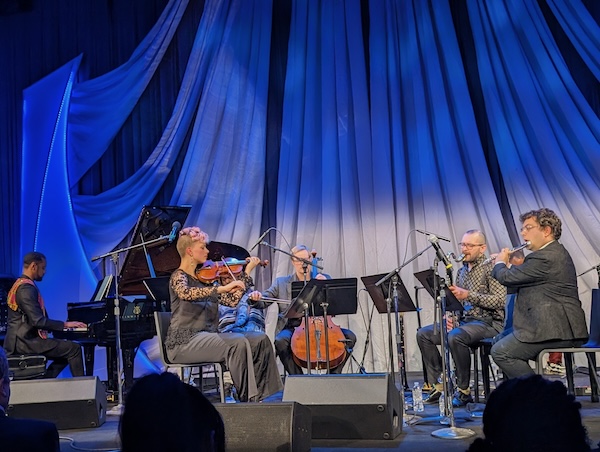Carlos Simon, Hub New Music program reflects tragedy and transcendence

Carlos Simon and Hub New Music performed Thursday night at the Kennedy Center Reach’s Studio K. Photo: WCR
On Thursday evening, new music brought the Fortas Chamber Music Concerts series back to Studio K, the bar-like venue in the Kennedy Center Reach. The main event was the moving Requiem for the Enslaved, composed by Carlos Simon. (He recorded the work with Hub New Music, released by Decca in 2022.)
Hub is an unusual ensemble combining flute and clarinet with violin and cello. On the concert’s first half were four pieces composed specifically for them, commissioned to be part of the recording marking the group’s tenth anniversary this season.
Angélica Negrón, born in Puerto Rico but now residing in Brooklyn, has described her Pedazos intermitentes de un lugar ya fragmentado as about the construction of identity for those belonging to two places. The work incorporated the composer’s field recording, made during her visits to friends and family in Puerto Rico. The sounds it introduced included an owl’s hooting, other bird calls, and the impatient honks of distant traffic.
Negrón’s music recalled the incessant churn of noise in the recording, made gentler as music from the four instruments. The woodwinds took most of the bird call sounds, with chirps and tweets, while the strings often held longer notes. While the piece rarely strayed from its harmonic center, repeated staccato notes on clashing car-horn seconds add dissonant interest.
Jessica Meyer’s Spirits and Sinew also told an exotic story, about the spells of Marie Laveau, the Voodoo Queen of New Orleans. The sense of a haunting came through in the moaning glissandi of the strings, the breath blown without pitch through the flute, and croaks played on the bridge of the cello by Jesse Christeson. The alto flute, played by Michael Avitabile, took the role of exorcist, at times playing while humming through the instrument simultaneously. A collective scream from the four musicians marked the end of the incantation.
Tyshawn Sorey’s For Alvin Singleton channeled the spirit of Morton Feldman in some ways, with writing centered on extremely soft textures at excessively slow tempos. Violinist Meg Rohrer and clarinetist Gleb Kanasevich controlled their normally dominant sound to the point of evanescence. Cell phone rings and other digital noises from the audience distracted from this slowly unfolding piece, which could have come to an end convincingly several times but kept on going.
Nico Muhly’s Drown was inspired by an object carved by James Drown, during five months living on a remote island in the South Atlantic. Marked by Muhly’s minimalistic style, the music repeats with lots of variation of textures, returning to the note D to mark time, recalling the notches that Drown carved on his piece of wood. The group’s performance captured the sense of the pattern of days, coming to a sudden end.
Catholic institutions founded here in Washington before the Civil War have been reckoning with their involvement in the historical practice of slavery. In 1838, the Jesuit priests of Georgetown University paid off the college’s debts with money from the sale of 272 enslaved persons, including children as young as two months old, who were sent on ships to plantations in Louisiana. In 2016, the university offered a free college education to all verified descendants of these enslaved people.
Carlos Simon, now a Georgetown professor, and the same forces that made the recording performed the Requiem for the Enslaved earlier this year at the university. They reunited for this concert, with powerful results, at the city’s most important cultural venue. Simon explained that the work merges Catholic music, represented by the Gregorian chant “In paradisum” from the Latin Requiem Mass, with vernacular music of the African-American tradition.
Much of the sound came from a pre-recorded track, including some of the spoken recitation of the names of the people sold, the tolling of a bell, and other sounds. The list of the children sold, with their ages from 12 down to 1 year old, was particularly devastating to hear. Avitabile, again taking up the alto flute, played and repeated the Gregorian chant, which was later transformed by trumpeter MK Zulu, a Howard University alumnus hailing from Forestville, Maryland, with jazzy bends and blue notes.
Memphis-based rapper Marco Pavé reprised his contributions to many of the movements, starting with “Lord have mercy,” weaving together the words from the Catholic liturgy with contemporary pleas for mercy. Simon and Zulu wove in the theme of the Gospel tune “When the Saints Go Marching In,” which shares the same opening motif as the chant (do-mi-fa-sol), a coincidence revealed by Simon’s juxtaposition of them.
Simon, a preacher’s son, incorporated spirituals in a powerful and utterly authentic way, later adding his own take on “Swing Low, Sweet Chariot,” first stated in an extended riff by violin and cello. The interludes played by Hub New Music, more contrapuntal and dissonant, did not always seem to fit comfortably into the overall structure, overstaying their welcome by the end of the half-hour performance.
The Pentecostal aura hung in the air, especially when Pavé called out “Ashé” several times toward the end, a Yoruba word that in black churches has the same meaning as Amen, and many in the audience instinctively answered him with the same word. A single encore, played by Simon alone at the piano, was greeted with cries of “Play it, Carlos” and “Do it for the Lord.” In a more expansive take on “Swing Low,” Simon did just that.
The Catalyst Quartet performs music by Ravel, Riley, Webern, and Cage 7:30 p.m. March 21, also at Studio K. kennedy-center.org
